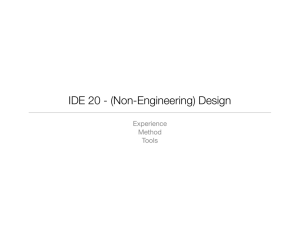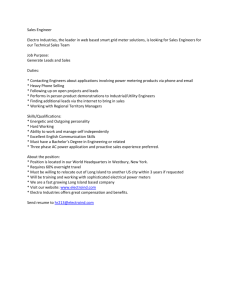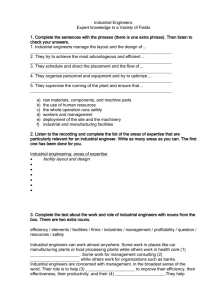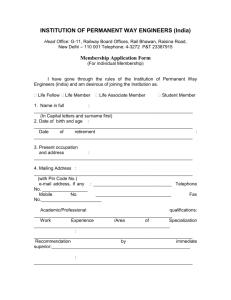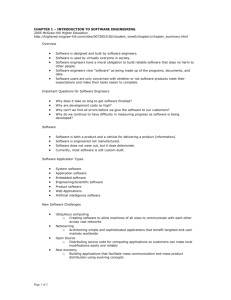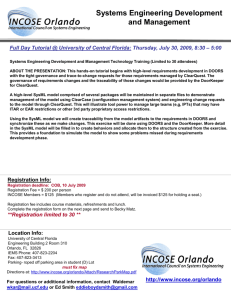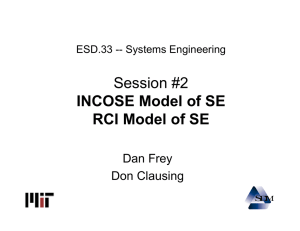Models for Incorporating Information into Innovation - UNO-EF
advertisement
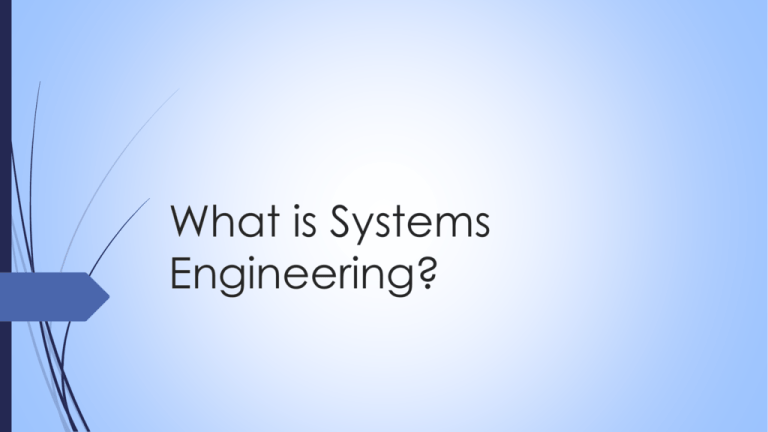
What is Systems Engineering? Systems engineering is a relatively new discipline, getting its start with military and space programs in the mid-1960s. INCOSE, The International Council on Systems Engineering was formed in 1990 and has grown to over 8,000 members in over 50 countries https://www.asme.org/career-education/articles/certification/certified-systems-engineersare-in-high-demand What is systems engineering? Systems Engineering is an interdisciplinary approach and means to enable the realization of successful systems. It focuses on defining customer needs and required functionality early in the development cycle, documenting requirements, then proceeding with design synthesis and system validation while considering the complete problem Operations Performance Test Manufacturing Cost & Schedule Training & Support Disposal Systems Engineering integrates all the disciplines and specialty groups into a team effort forming a structured development process that proceeds from concept to production to operation. Systems Engineering considers both the business and the technical needs of all customers with the goal of providing a quality product that meets the user needs http://www.incose.org/practice/whatissystemseng.aspx What do systems engineers do? Systems engineers concentrate their efforts on the aspects of the engineering process that serve to organize and coordinate other engineering activities. The systems engineer is the primary interface between management, customers, suppliers, and specialty engineers in the systems development process Gregory S. Parnell, Patrick J. Driscoll , Dale L. Henderson, 2nd Ed, Systems Decision Making in Systems Engineering and Management. John Wiley & Sons, Inc., Hoboken, New Jersey, November 2010, pg 198. What are the Skills and Qualities required to by a Systems Engineer? Good math skills Strong time management skills Aptitude for systems thinking Good common sense A strong desire for organization and efficiency Excellent communication/salesmanship Creative problem solving Quantitative skills Technical competency Continuous drive for improvement Resourcefulness Listening skills Negotiation skills Diplomacy Patience Ability to adapt to many environments, wear many hats and interact with a diverse group of individuals Inquisitive mind Continuous desire to learn Leadership skills Ethics http://www.incose.org/educationcareers/careersinsystemseng.aspx 6 Systems Engineering is an interdisciplinary process comprised of the following seven tasks summarized with the acronym SIMILAR (Bahill and Gissing, 1998). Bahill, A.T. and Gissing, B., Re-evaluating systems engineering concepts using systems thinking, IEEE Transactions on Systems, Man and Cybernetics, Part C: Applications and Reviews, Volume 28, Number 4, pp. 516-527, November 1998. The Steady Rise in Systems Engineering Interest A search in Compendex on the term “Systems Engineering” in the title from the years 1995 – present yields 2,286 abstracts. Systems Engineering Abstract Records/ Year 250 200 150 100 50 0 1996 1997 1998 1999 2000 2001 2002 2003 2004 2005 2006 2007 2008 2009 2010 2011 2012 What topics are researched in Systems Engineering? Top 20 Keyword Topics TECHNOLOGY DECISION MAKING OPTIMIZATION PRODUCT DESIGN LARGE SCALE SYSTEMS TEACHING INDUSTRY INDUSTRIAL ENGINEERING COMPUTER SOFTWARE LIFE CYCLE MATHEMATICAL MODELS PRODUCT DEVELOPMENT STUDENTS SOFTWARE ENGINEERING CURRICULA DESIGN COMPUTER SIMULATION SYSTEMS ANALYSIS PROJECT MANAGEMENT ENGINEERING EDUCATION 76 77 78 79 80 81 82 89 95 108 108 118 132 133 136 136 148 161 181 185 0 20 40 60 80 100 120 140 160 180 200 Top Affiliations Mitre Corporation Stevens Institute Of Technology Jet Propulsion Laboratory, California Institute Of Technology Massachusetts Institute Of Technology Aerospace Corporation Boeing Company Systems Engineering And Evaluation Centre, University Of South Australia Georgia Institute Of Technology Sandia National Laboratories Bae Systems Lockheed Martin 27 37 19 18 12 12 11 9 9 8 7 Projects Performed by Systems Engineers Representing a company in the design and construction of the next generation commercial aircraft Designing the network services needed for a cellular communications system Developing a communications satellite Developing and launching NASA's Jupiter Icy Moons Orbiter (JIMO) Working on a design project to make a medical device for heart defibrillation Designing the electromagnetic launch system for a nuclear powered aircraft carrier Developing the architecture for the US Army's Future Combat System consisting of trucks, tanks, aircraft, unmanned aerial and ground vehicles, associated communication systems, and soldiers Performing simulation of a proposed operational concept for a new product Representing systems engineering issues on an integrated product team Performing research on the next generation systems engineering software tool Systems Engineering in Louisiana: Jobs 157 jobs on engineeringjobs.com in Systems Engineering alone from a wide spectrum of systems. For example, Control systems Enterprise systems Subsea systems Power systems Telecommunication systems Propulsion systems Fluid systems Systems Engineering in Louisiana: Regional Systems The concept of Regional Systems of Innovation (RSI) results from a territorially embedded institutional infrastructure and a production system. The central idea is that the innovative performance of an economy depends on the innovative capabilities of firms and research institutions, and on the ways they interact with each other and public institutions As a region, we need more individuals trained to understand the way the regional system interacts for innovation and economic growth. What we should know about regional systems of innovationD. Doloreux, Linköping University, Systems of Innovation Research Program, Department of Technology and Social Change, 581 83 Linköping, Sweden
